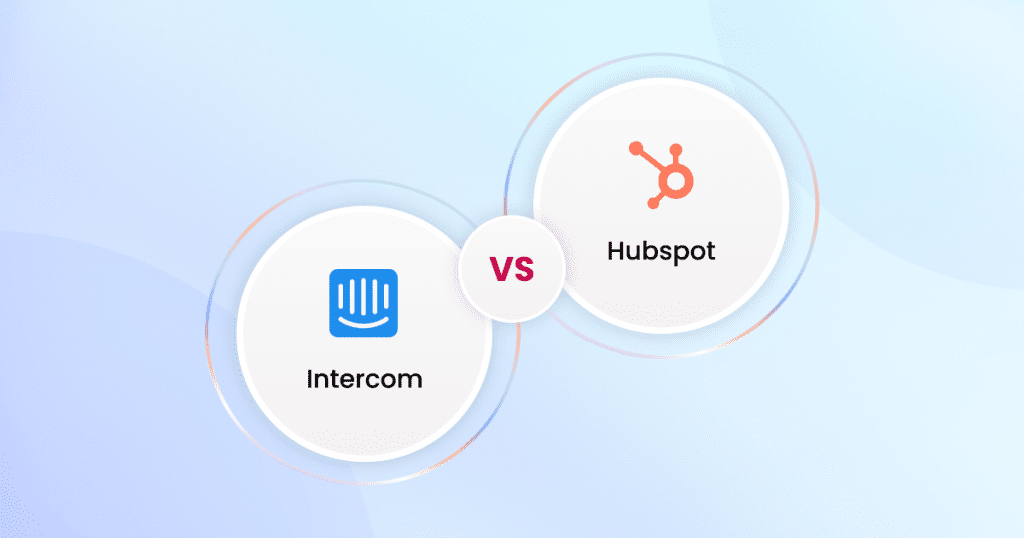When you’re comparing Intercom vs HubSpot, consider your specific needs for customer interaction. Intercom shines with real-time messaging and AI-driven support, making it ideal for immediate engagement.
It has features like live chat and an organized conversation history. HubSpot, meanwhile, integrates an all-encompassing CRM with a ticketing system and customer portal, emphasizing structured support.
Understanding these distinctions will help you select the best option for your business, and there’s more valuable insight ahead.
Understanding these distinctions can help you choose the platform that best meets your business needs, especially considering factors like Zendesk’s multi-channel support which can also influence your decision.
Table of Contents
Overview of Intercom vs HubSpot Service Hub
You might wonder why comparing Intercom vs HubSpot Service Hub is significant for your business.
Each platform offers unique features that can greatly impact how you manage customer interactions and support.
For instance, key features of Intercom like live chat and outbound messaging can improve your customer engagement efforts.
Why compare these two platforms?
In the landscape of customer support solutions, comparing Intercom vs HubSpot Service Hub is essential for businesses seeking the best fit for their needs.
Each customer support platform has unique features, integration capabilities, and approaches to enhancing customer satisfaction.
As companies increasingly seek alternatives due to higher-than-average pricing plans and challenges with support responsiveness, understanding these differences becomes even more important.
Read More: 13 Best Intercom Alternatives & Competitors ( Updated 2024 )
Quick Summary About Key Comparisons
Focus: Intercom specializes in real-time customer communication, while HubSpot integrates customer support with a comprehensive CRM system.
User Interface: Intercom has a more intuitive interface for easier navigation, whereas HubSpot’s interface is feature-rich but more complex.
Pricing: Intercom’s pricing can become complex and expensive, starting at $74/month for two seats. HubSpot offers a simpler structure, starting at $45/month with a free plan available.
CRM Integration: HubSpot is tightly integrated with its CRM for seamless customer management, while Intercom focuses more on enhancing engagement through messaging.
Customer Portal: HubSpot includes a dedicated customer portal for tracking tickets and community discussions, whereas Intercom lacks this feature.
Reporting: HubSpot provides robust, customizable reporting tools, while Intercom focuses on insights related to customer engagement and chatbot performance.
Live Chat: Intercom offers advanced AI-driven live chat features, excelling in real-time messaging, while HubSpot’s live chat is customizable but less sophisticated.
What is Intercom?

Intercom is a powerful customer communication platform that helps you connect with your users in real time.
It offers features like chat history, automated messaging, and product walkthroughs to improve customer engagement and support.
By using its tools, you can personalize interactions, manage conversations efficiently, and drive business growth effectively.
Furthermore, integrating Intercom with your ecommerce CRM can streamline customer relationships and improve comprehensive customer lifecycle management, which is essential for increasing sales and enhancing customer experience in the digital marketplace ecommerce CRM tools.
Key features and capabilities of Intercom
At its core, Intercom is a dynamic customer communication platform designed to boost user interactions through a suite of powerful tools.
With its focus on customer engagement, it serves as a valuable alternative to HubSpot’s high pricing for many businesses.
Here are some key features and capabilities you’ll find in Intercom:
- Live Chat: Engage customers in real-time, ensuring immediate support and assistance.
- AI-driven Chat: Utilize a multilingual chatbot named Fin that provides 24/7 support in 43 languages.
- Conversation Organization: Manage customer interactions effectively by organizing chats by team, keeping a clear history for follow-ups.
- Knowledge Base: Reduce support workloads and improve self-service options for customers.
These features make Intercom a strong choice for businesses looking to boost customer communication and streamline interactions.
What is HubSpot Service Hub?

HubSpot Service Hub is a powerful tool designed to improve customer support and interactions.
It features a ticketing system for managing inquiries, a customer portal for tracking requests, and automation to streamline processes.
Key features and capabilities of HubSpot Service Hub
In relation to enhancing customer service, HubSpot Service Hub stands out as a thorough platform that integrates seamlessly with HubSpot’s Smart CRM.
This customer service platform offers several key features to improve your support processes:
- Ticketing System: Efficiently track and manage customer inquiries, ensuring timely responses.
- Customer Portal: Allow users to monitor their support requests and access a knowledge base easily.
- Team Efficiency: Utilize automation tools that can enhance ticket close rates by 24% over a year.
- Advanced Reporting Capabilities: Analyze customer satisfaction and team performance through customizable dashboards.
Intercom vs HubSpot: Feature Comparison

When comparing Intercom vs HubSpot, you’ll notice they each offer unique features tailored to different business needs.
You should consider factors like pricing and value for money, ease of use and interface, live chat and AI-powered engagement, reporting and analytics, and customer portals and knowledge bases.
Understanding these elements will help you choose the platform that best suits your organization’s goals and customer engagement strategies.
1. Pricing and Value for Money

As you investigate pricing and value for money between Intercom and HubSpot, you’ll notice significant differences in their structures. Understanding these differences can help you make the right choice for your business needs. Here are some key points to contemplate:
- Intercom pricing starts at $74/month for two seats, with extra costs for advanced features.
- HubSpot offers a more straightforward pricing model, beginning at $45/month, plus a free plan for basic functions.
- Intercom provides a 95% discount for early-stage startups, enhancing its value for money.
- HubSpot’s pricing transparency allows for better budget management compared to Intercom’s complex pricing structure.
Keep these factors in mind as you assess customer service tools for your organization.
2. Ease of Use and Interface
Steering the ease of use and interface of Intercom and HubSpot reveals key differences that can greatly impact your team’s efficiency.
- Intercom has a clean, intuitive interface that simplifies navigation, enhancing user experience.
- HubSpot’s interface is feature-rich but often feels clunky, which can overwhelm users.
- With Intercom, you’ll find a shorter learning curve, allowing quicker adoption for customer communication.
- HubSpot requires more training time to navigate its complex dashboard effectively.
3. Live Chat and AI-Powered Engagement
Both Intercom and HubSpot offer robust live chat and AI-powered engagement tools, but they cater to different business needs. Here’s how they compare:
- Intercom features advanced AI-driven live chat that supports 43 languages and provides 24/7 assistance through its chatbot, Fin.
- HubSpot provides a free live chat tool with a simple chatbot builder for appointment scheduling and common inquiries.
- Intercom emphasizes real-time messaging and personalized interactions, ideal for immediate customer support.
- HubSpot allows seamless integration with its CRM, giving a thorough view of customer interactions and data.
While both platforms improve customer service, Intercom’s advanced capabilities offer a more sophisticated engagement experience than HubSpot’s straightforward approach.
Your choice should reflect your specific needs in live chat tools.
4. Reporting and Analytics
Regarding reporting and analytics, Intercom and HubSpot each bring unique strengths to the table. Here’s what you should know:
- HubSpot offers customizable reporting widgets and pre-built reports that integrate CRM data for tailored insights into customer interactions.
- Intercom provides AI-driven insights and pre-built reports that focus on performance metrics like response time and conversation analysis.
- HubSpot enables sharing of dashboards via Slack or email, promoting collaboration on customer support metrics among team members.
- Intercom emphasizes chatbot performance and conversation quality, giving a different view of customer engagement compared to HubSpot’s broader analytics.
Both platforms utilize analytics to improve customer support strategies, but your choice will depend on your specific needs and how you prioritize customer interactions.
5. Customer Portals and Knowledge Base
Steering through customer support options is crucial for enhancing user experience, and in relation to customer portals and knowledge bases, HubSpot and Intercom take different paths.
HubSpot provides a dedicated customer portal, allowing you to track support requests and access a customizable knowledge base for better self-service.
Intercom, however, lacks an integrated customer portal, limiting your ability to view ticket statuses directly.
Here’s a quick comparison:
- HubSpot’s customer portal is customizable and SEO-optimized.
- Intercom’s knowledge base offers self-service assistance but without a portal.
- HubSpot supports extensive tracking of customer interactions.
- Intercom focuses on real-time chat, lacking structured navigation.
Integration and Compatibility
In terms of integrating with CRM platforms, both Intercom and HubSpot take different approaches.
Intercom offers smooth integration with its own suite of tools, making it easier for you to manage customer interactions.
In contrast, HubSpot supports a wider range of third-party integrations, giving you more options to connect with diverse systems.
How Intercom and HubSpot integrate with CRM platforms
Choosing the right integration with CRM platforms can greatly improve your customer engagement strategies.
Intercom excels in real-time data synchronization, allowing you to keep customer interactions up-to-date. This guarantees your customer support team has the latest insights to boost engagement.
On the other hand, HubSpot Service Hub offers a seamless CRM integration that provides a unified view of customer interactions. This lets you manage support tickets directly from the CRM interface, streamlining your processes.
Both platforms support third-party integrations, which can further improve your customer support capabilities.
Furthermore, HubSpot’s analytics and reporting tools help you track customer satisfaction and support performance across different channels.
Choose the integration that aligns best with your operational needs for peak effectiveness.
Which Tool Should You Choose?
When choosing between Intercom and HubSpot, think about your business needs primarily.
Consider factors like your budget, the importance of real-time communication versus structured support, and whether you need features like a customer portal.
Factors to consider based on your business needs
As you assess which customer support tool fits your business needs best, it’s essential to evaluate several key factors.
To begin, consider the complexity of features. If you prefer real-time messaging, Intercom excels; however, HubSpot offers extensive service management but can be overwhelming.
Next, think about pricing. HubSpot provides a free plan and lower starting prices, while Intercom’s pricing may increase with added features.
Integration capabilities also matter; HubSpot works well with its CRM, giving you a complete view of customer interactions, while Intercom emphasizes third-party integrations.
Don’t forget user experience, as Intercom is user-friendly, and HubSpot can feel cluttered.
Final thoughts on Intercom vs HubSpot
Choosing between Intercom and HubSpot ultimately hinges on your organization’s specific requirements and priorities.
If your customer service teams value real-time interactions and a strong live chat feature, Intercom might be your best bet. Its AI-driven support excels in delivering personalized customer experiences.
However, if you seek an all-encompassing suite with transparent pricing, HubSpot stands out. It offers robust reporting and analytics, along with a dedicated customer portal, enhancing operational efficiency. HubSpot’s self-service options are also beneficial for users.
Frequently Asked Questions
Q: Intercom vs HubSpot: What are the main differences between the two?
Mainly aimed at end-user communication, it allows sharing of inbox, works as a ticketing system and enables referral to knowledge base articles.
HubSpot, however, is a platform that assists in business sales and marketing providing solutions such as marketing automation, CRM and service hub enterprise.
Q: How does Intercom compare to HubSpot in terms of pricing options?
Intercom has several plans that depend on the model of customer service software as well as its scale, whereas pricing plans for HubSpot deal with the sales, marketing and service hub starter solutions.
Q: Can Intercom be integrated with HubSpot?
Integrating Intercom with HubSpot is indeed possible, and this leads to good communication and collaboration between the two service platforms.
Q: What are the key features of HubSpot’s CRM compared to Intercom?
It provides a shared inbox, ticketing system and help desk as sales and marketing features of HubSpot CRM to serve as the central source of truth for customer data.
On the other hand, Intercom provides for customer communication and has a help centre comprising knowledge base articles.


